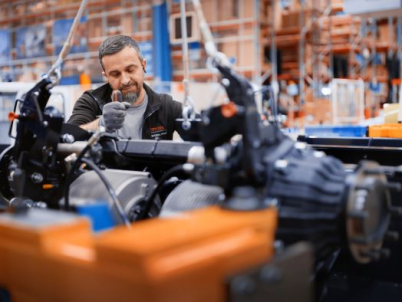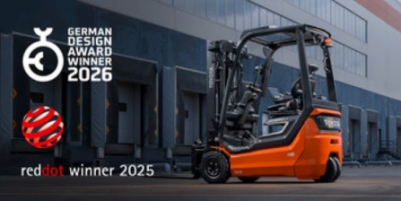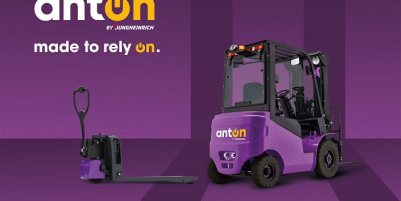-
Rite-Hite unveils new range of hydraulic kits to upgrade and extend dock leveller performance - 2 days ago
-
REWE and Cimcorp automate fresh supply chain for Berlin supermarkets and stores - 2 days ago
-
Q1 – A recovery period or time to fix, switch and scale? - 2 days ago
-
NULOGY’S SHOP FLOOR SOFTWARE TO POWER COMPLETE CO-PACKING’SOPERATIONS - February 13, 2026
-
Why lead generation depends upon good content - February 13, 2026
-
Wallapop and Albatross Sign Strategic Partnership to Bring Real-Time AI Discovery to the Future of Consumer-to-Consumer Commerce - February 12, 2026
-
Thorworld ramp helps Hubergroup to streamline its unloading operation - February 6, 2026
-
TRACKER INNOVATION FROM QUECLINK TO BOOST STOLEN VEHICLE RECOVERY PERFORMANCE - February 4, 2026
-
Flexi Narrow Aisle hits 50! - January 29, 2026
-
DERRY BROS ATTRACTS RECORD NUMBERS OF FREIGHT CUSTOMERS SEEKING CUSTOMS SUPPORT - January 29, 2026
Toyota Material Handling UK’s Sales Training and Product Development Manager, Sam Gray, discusses HVO Fuel – a new alternative to fossil diesel that’s said to cut the net CO2 emissions of ic-engine-powered forklifts by as much as 90 per cent
With the growing drive to tackle the root causes of climate change, companies of all sizes now demand the most sustainable energy solutions for their forklift fleets. HVO – the latest fuel to come on to the market – is said to allow IC engine-powered forklift truck users to cut their net CO2 emissions by as much as 90 per cent, reduce nitrogen oxide (NOx), and cut both particulate matter (PM) and carbon monoxide (CO) emissions.
Unsurprisingly, many experts consider that HVO has a vital role to play in helping the UK achieve its 2050 net zero target for greenhouse gas emissions.
HVO – or, to give it its full name, Hydrotreated vegetable oil – is a low carbon, low emission, fossil-free, environmentally-friendly and sustainable alternative to conventional fossil diesel.
Part of the paraffinic family of fuels, it is clean and safe and meets all relevant fuel standards and EN 15940:2016 specifications.
Endorsed by a wide range of original engine manufacturers, HVO is synthetically produced using a complex refinery process that removes oxygen from vegetable oil and waste animal fat molecules and creates hydrocarbons very similar to regular diesel. But it is important to understand that HVO is not biodiesel: it’s fundamentally different and, as such, doesn’t suffer from any of the negative issues sometimes associated with biodiesel.
Impurities are removed from the fuel during the production cycle leaving a consistent, quality product that significantly reduces harmful emissions from diesel engines.
To add to HVO’s green credentials, only completely renewable materials are used in the production process and the crops from which the fuel is made are grown and harvested without damaging the environment or the natural ecosystem.
Already used to power a wide range of modern vehicles as well as construction machinery and industrial power systems, HVO is considered an eco-upgrade on diesel because it is a fuel that not only reduces emissions and burns more cleanly, but is also safer to handle than mineral diesel. While reduced particulate production during the combustion process reduces the ageing of engine oils and improves local air quality.
One of the biggest advantages of HVO is the fact that truck users do not need to modify their diesel-powered forklifts to use it. For example, nearly all Toyota industrial IC engines will run perfectly with HVO fuel and, importantly, no changes are required to the daily running or servicing regimes of Toyota diesel engines if the switch to HVO is made.
A further plus-point is the fact that, because HVO is 100 per cent interchangeable with conventional fossil diesel, it can be blended at any ratio. So forklift users can simply ‘top-up and go’ without any need to drain or clean fuel tanks. This ability to be interchanged with an absolute minimum of fuss has been recognised and most major engine manufacturers’ warranties will support an instant switch from diesel to HVO.
Possibly the only down-side is that when it comes to price HVO is slightly more expensive than traditional diesel. However, with the high-profile of climate change and environmental concerns always close to the top of the business agenda, many lift truck truck users believe that the relatively modest extra cost is a price worth paying to be seen to be doing the right thing for the planet.
Call Toyota on 0370 850 1409 or complete this form and a Toyota expert will be in touch.

































